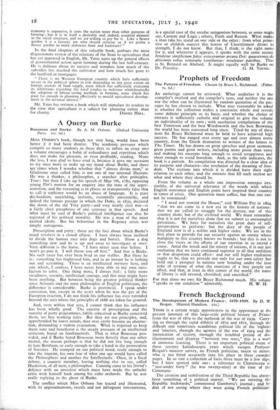Prophets of Freedom
The Pattern of Freedom. Chosen by Bruce L. Richmond. (Faber. 7s. 6d.)
AN anthology cannot be reviewed. What underlies it is the compiler's method and the compiler's taste, and neither the one nor the other can be illustrated by random quotation of the pas- sages he has chosen to include. What may reasonably be asked is whether the collection makes a consistent whole and reveals some definite principle as its basis, and whether the choice of extracts is sufficiently catholic and original to give the volume an individuality of its own ; with saccharine compilations of the best Tennyson and the best Wordsworth and the best Browning the world has been nauseated long since. Tried by any of these tests Sir Bruce Richmond must be held to have achieved high success. He has ranged over every age and over almost every country, from the Greek dramatists to writers of the letters to The Times. He has drawn on great speeches and great sermons, great poems and great writers, including more prose than verse and making his excerpts long enough to avoid scrappiness and short enough to avoid boredom. And, as the title indicates, the book is a pattern. Its compilation was directed by a clear idea of its purpose and character—the revelation of the meaning of free- dom. The sections into which it is divided have their right relation to each other, and the extracts that fill each section are what and where they should be.
From the volume as a whole one impression emerges irre- sistibly, of the universal relevance of the words with which English statesmen and English poets have inspired their country in times of crisis. One quotation must suffice, but that one can- not be renounced : " I need not remind the House," said William Pitt in 1804, "that we are come to a new era in the history of nations : that we are called to struggle for the destiny, not of this country alone, but of the civilised world. We must remember that it is not for ourselves alone that we submit to unexampled privations. We have for ourselves the great duty of self- preservation to perform: but the duty of the people of England now is of a nobler and higher order. We are in the first place to provide for our security against an enemy whose malignity to this country knows no bounds : but this is not to close the views or the efforts of our exertion in so sacred a cause. Amid the wreck and the misery of nations, it is our just exultation that we have continued superior to all that ambition or that despotism could effect : and our still higher exultation ought to be, that we provide not only for our own safety but hold out a prospect to nations now bending under the iron yoke of tyranny of what -the exertions of a free people can effect, and that, at least in this corner of the world, the name of liberty is still revered, cherished, and sanctified."
For that alone we owe Sir Bruce Richmond much. His volume "speaks to our condition" admirably. H. W. H.






























 Previous page
Previous page